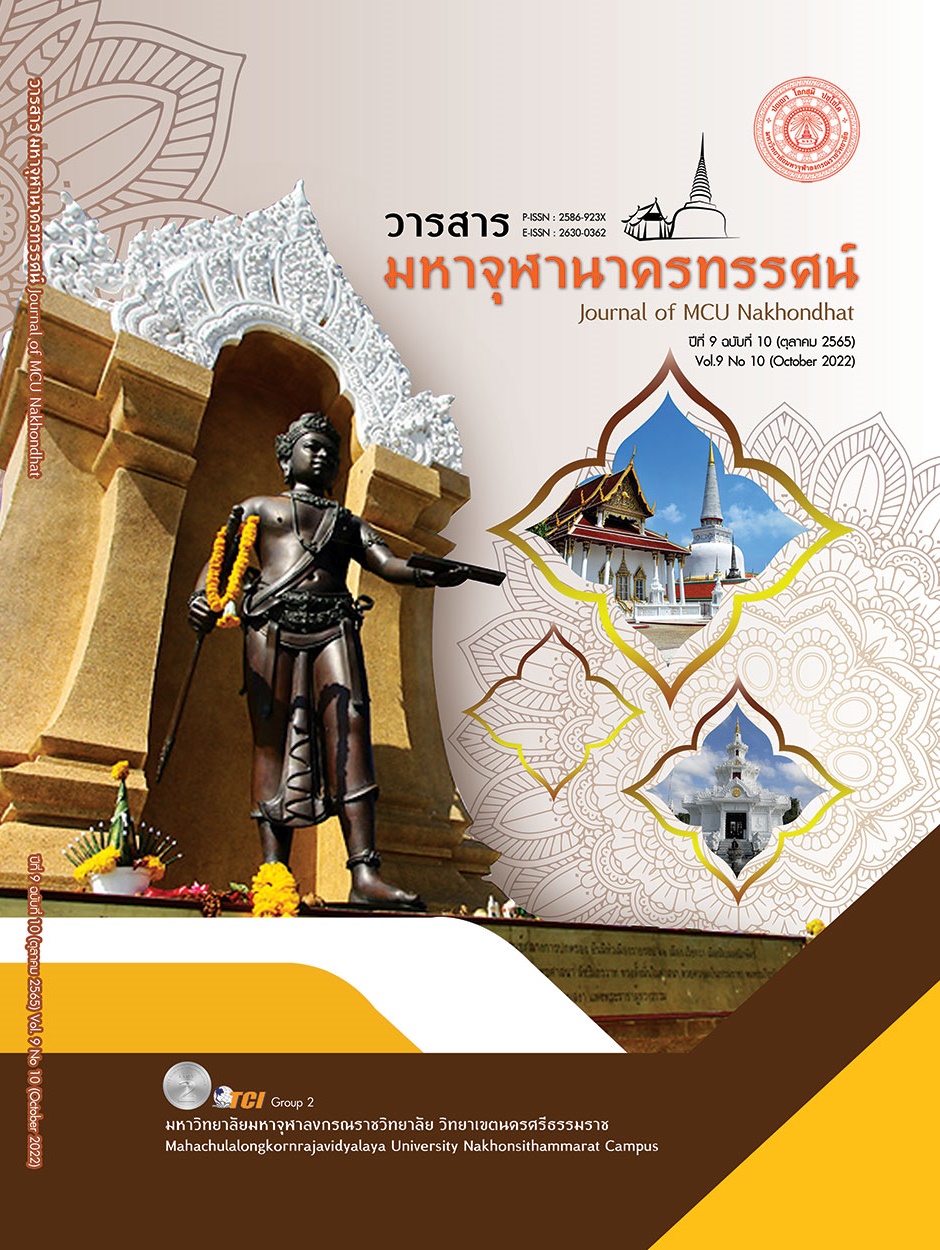ANALYTICAL STUDY FOR PROMOTION OF LOCAL LEADERSHIP ACCORDING TO BRAHMAVIHARA 4
Main Article Content
Abstract
This article aims to analyze and analyze the promotion of local leadership according to Brahma Vihara 4, which is a study from textbooks, books, research papers, academic articles, and scriptures such as the Tripitaka Commentaries, etc. From the study, it was found that Promoting leadership to have principles of behavior and practice in the roles and duties of local leaders that is necessary to adapt in the era of changes in technology, communication, economy, society, culture, interpersonal interaction including changing lifestyles in addition, the lead must have knowledge, competence, honesty. be fair Being a good role model for people in society and their subordinates There are still important principles in Buddhism that must be taken as a guideline for practice. The four principles of Brahma Vihara are 1) mercy, affection, good desire, wanting him to be happy. Has a mind that is friendly and thinks to benefit human beings all over the face. 2) Kindness, compassion, thinking helps to get out of suffering. Focusing on the relief of suffering and suffering of all beings. 3) Mudita, the joy when others are well and happy. have a bright mind, entertainment endowed with a feeling of constant joy for all beings who live in peace Ploy rejoices when he is well and happy. 4) equanimity, neutral trust which will allow him to live in the Dharma as he considers with wisdom which the Brahma Vihara 4 This can be applied in every age, every religion, every race, as the principle of governing subordinates or people in society in order to solve problems in society in order to create peace in society. unity of people in society the cooperation of the people in the community can lead to sustainable development.
Article Details

This work is licensed under a Creative Commons Attribution-NonCommercial-NoDerivatives 4.0 International License.
References
กระทรวงเทคโนโลยีสารสนเทศและการสื่อสาร. (2559). แผนพัฒนาดิจิทัลเพื่อเศรษฐกิจและสังคม, (พิมพ์ครั้งที่ 1). กรุงเทพมหานคร: กระทรวงเทคโนโลยีสารสนเทศและการสื่อสาร.
พระพรหมคุณาภรณ์ (ป.อ.ปยุตฺโต). (2546). ภาวะผู้นำความสำคัญต่อการพัฒนาคนพัฒนาประเทศ. กรุงเทพมหานคร: ธรรมสภา.
พระราชบัญญัติกำหนดแผนและขั้นตอนการกระจายอำนาจให้แก่องค์การปกครองส่วนท้องถิ่น พ.ศ.2542. (2542). ราชกิจจานุเบกษา เล่ม 116 ตอนที่ 114 ก หน้า 48 (17 พฤศจิกายน 2542).
พิชาภพ พันธุ์แพ. (2554). ผู้นำกับการจัดการการเปลี่ยนแปลง. (พิมพ์ครั้งที่ 2). กรุงเทพมหานคร: สำนักพิมพ์แห่งจุฬาลงกรณ์มหาวิทยาลัย.
สมมารถ สูรโรคา. (2553). ภาวะผู้นำการเปลี่ยนแปลงที่ส่งผลต่อประสิทธิผลการบริหาร การศึกษาองค์การบริหารส่วนตำบลวิทยานิพนธ์ปริญญาศึกษาศาสตรมหาบัณฑิต. ใน วิทยานิพนธ์ศึกษาศาสตรมหาบัณฑิต สาขาการบริหารการศึกษา. มหาวิทยาลัยศิลปากร.
สายันต์ บุญใบ. (2555). การวิจัยและพัฒนาตัวแบบการพัฒนาภาวะผู้นำของประธาน สาขาวิชาดนตรีในมหาวิทยาลัยราชภัฏ. วารสารการบริหารการศึกษาและภาวะผู้นำมหาวิทยาลัยราชภัฏสกลนคร, 1(1), 13-22.
อมรรัตน์ เทพพิทักษ์. (2552). ความสัมพันธ์ระหว่างภาวะผู้นำการเปลี่ยนแปลง กับแรงจูงใจใฝ่สัมฤทธิ์ของจ้าหน้าที่กรมการค้าภายใน กระทรวงพาณิชย์. ใน วิทยานิพนธ์ศิลปศาสตรมหาบัณฑติ สาขาวิชารัฐประศาสนศาสตร์. มหาวิทยาลัยมหิดล.


